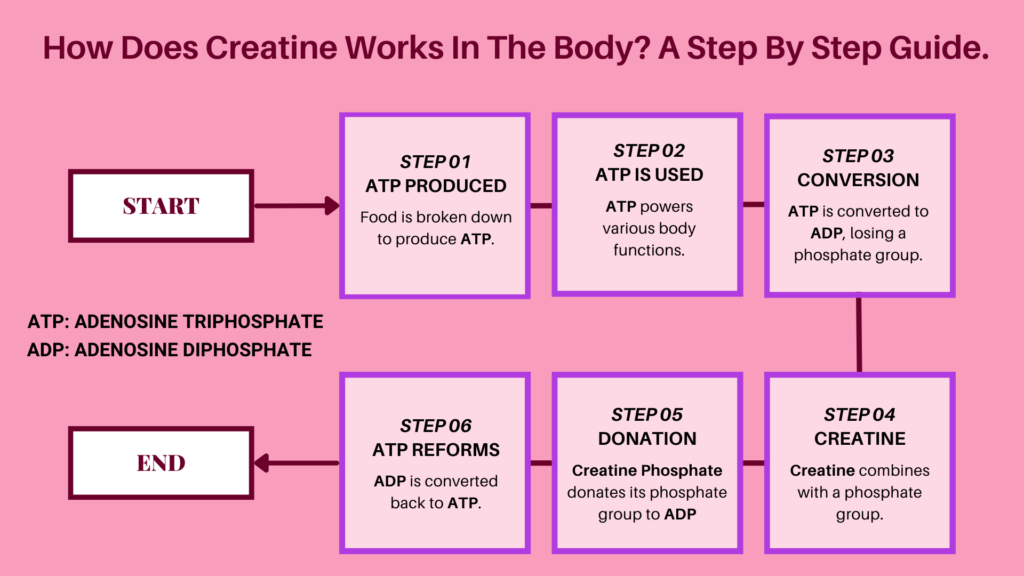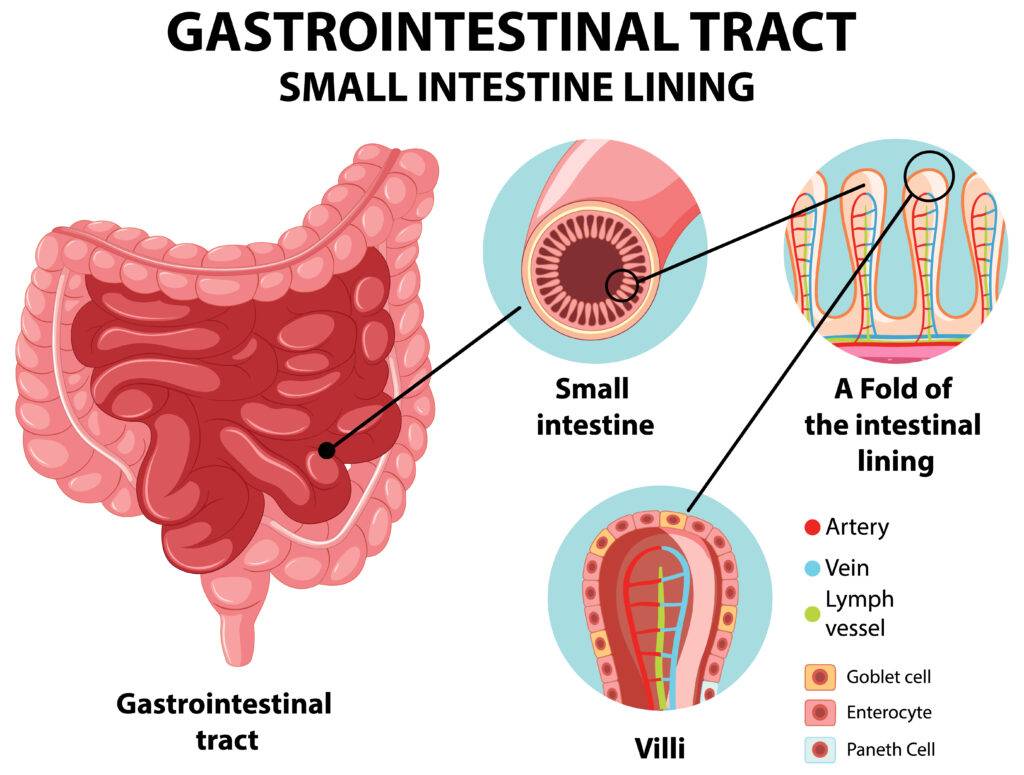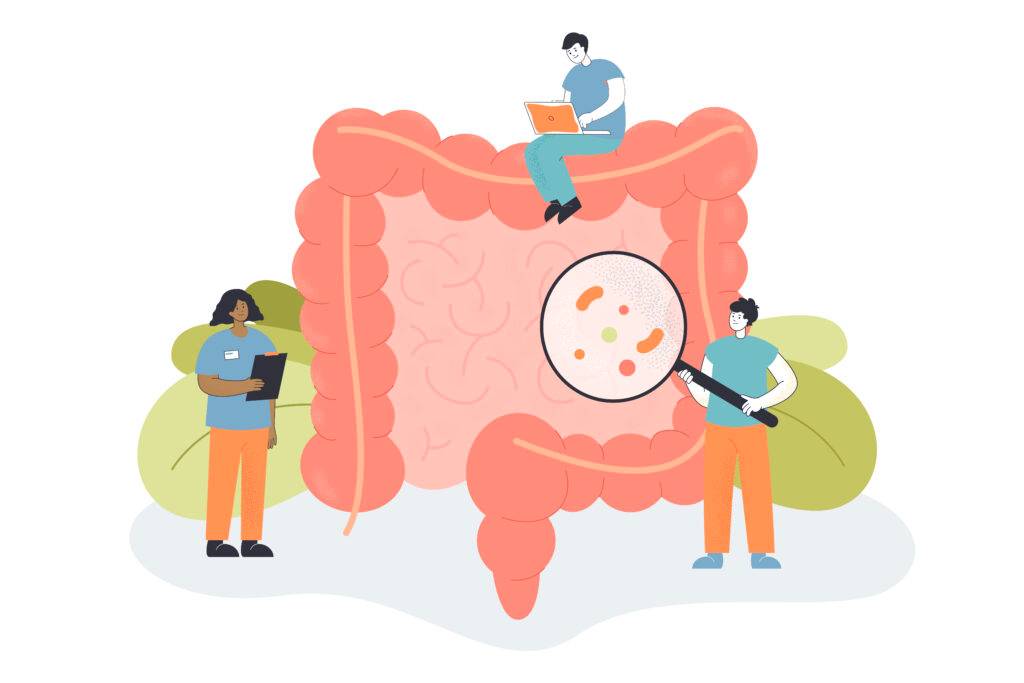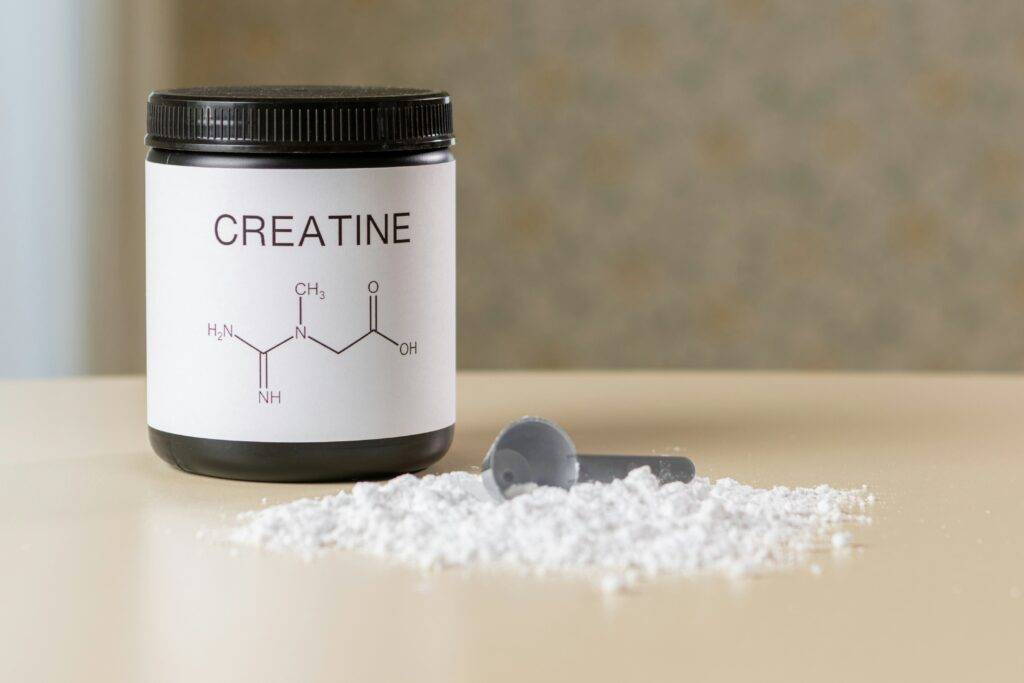Creatine and constipation are a common topic amongst fitness enthusiasts. Well, fear not! You are in the best place possible on the internet to know everything about it. In this article, I will dive deep and talk about everything there is to know about creatine-induced constipation. From “Whys” to “Hows” this ultimate guide has every answer to your question.
Before starting, I want to mention that the article will be long. For this reason, I have introduced a table of contents for easy navigation.
The Ultimate Guide to Creatine and Constipation
Understanding Creatine and Its Effects on the Body
What Is Creatine?
Well, creatine is a non-protein amino acid that is found in our muscles mostly in the form of phosphocreatine or creatine phosphate and is derived from three amino acids, arginine, glycine and methionine. Now, phosphocreatine and creatine phosphate contribute to making adenosine triphosphate (ATP) in our body and this ATP ensures that we are getting enough energy to function our body including muscle contractions. Creatine can be found in other parts of our bodies in small amounts like the brain, liver, pancreas and kidneys.
How Creatine Works in the Body
Our body produces adenosine triphosphate (ATP) by breaking down carbs, protein and fats from the foods. Then we use this ATP to power up almost every function of our body resulting in ATP converting into adenosine diphosphate (ADP) leading to the loss of one of its phosphate groups. Now ADP itself is not very effective on its own and therefore needs to be converted back to ATP. This is where creatine comes in by combining with a phosphate molecule in our body to produce creatine phosphate and that creatine phosphate donates its phosphate group to ADP therefore converting it back into ATP resulting in an increased amount of ATP available in our bodies allowing us to function for longer period.
For you to fully understand the science behind it, I have made a flow chart. Here it is:

The Most Common Use of Creatine Supplements
Creatine is a popular supplement amongst fitness enthusiasts and people playing sports. It is also one of the widely used ingredients in dietary supplements. One of the most common uses of creatine supplementation includes:
Enhancing Athletic Performance
We are now familiar with the idea that creatine increases Adenosine triphosphate (ATP) leading to improved and longer functioning of the human body due to more energy. Therefore athletes consume creatine to fuel themselves to work harder and achieve more resulting in increased muscle mass, strength and endurance.
Does Creatine Cause Constipation?
Can Creatine Alter Digestive Function?
When we consume creatine in higher doses, for example, 10 grams per day, then this can lead to the creatine not being fully absorbed by the intestine which can result in the gastrointestinal tract drawing more water leading to an alteration in the digestive function like bloating, diarrhoea, cramping, and other digestive discomfort. However, if we stay within the recommended dosage of 3 to 5 grams per day then chances of such alteration in the digestive function can be avoided.

Image Source: Freepik
Image Author: brgfx
How Common Is Creatine-Induced Constipation?
Most people who consume creatine did not report any significant creatine-induced constipation. Rather the frequency is anecdotal and subjective to factors like dehydration, higher doses of creatine intake or during the loading phase where doses exceed 10 grams per day.
Scientific Evidence Linking Creatine to Constipation
According to the National Library of Medicine, a study conducted for 28 days in 2008 on “Gastrointestinal distress after creatine supplementation in athletes: are side effects dose dependent” concluded that some participants reported symptoms like diarrhoea (39%), stomach upset (23.8%), and belching (16.9%) after consuming creatine. However, no sign of constipation linked to creatine supplementation compared to placebo.
Mechanisms Behind Creatine-Induced Constipation
Increased Water Absorption in the Intestines
As discussed earlier, creatine primarily draws water into our muscle cells and creates a shortage of water in our digestive tract. This leads to our colon absorbing more water from the stool resulting in an increased water absorption in the intestines.
Impact on Gut Flora and Digestion
Gut flora or gut microbiota prevents any negative alteration in our digestive health that can lead to gastrointestinal issues like constipation. While scientific research is limited it is often hypothesised that consuming creatine can lead to an imbalance in the diversity of good bacteria that aid in digestion and stool formation resulting in creatine-induced constipation.

Image Source: Freepik
Image Author: pch.vector
Individual Sensitivity to Creatine
Individual reactions to creatine supplements can vary especially contributing to issues like creatine-induced constipation.
Genetic Factors
Our genetics can determine how we respond to creatine because people like “non-responders” whose bodies do not get much benefit from consuming creatine because their bodies do not use it well. It can be either due to creatine was not absorbed properly or the body does not use creatine as efficiently as it should. This leads to creatine-induced constipation since their bodies are not handling that extra creatine smoothly.
Body Composition
Creatine consumers with greater muscle mass can expect better outcomes because the muscle can store more of it. On the other hand, creatine consumers with lesser muscle mass will not benefit as much leading to increased chances of creatine-induced constipation.
Dietary Influence
If we already consume creatine-rich foods like red meat and fish, then our muscles already have a higher creatine content than base level. So we might not get as much benefit from consuming creatine supplements therefore leaving us with extra creatine content in our bodies leading to excess creatine absorption difficulties by the intestine resulting in creatine-induced constipation.
On the contrary, if we consume a vegetable-rich creatine diet then we might notice more significant side effects of creatine-induced constipation due to the larger relative increase in muscle creatine levels supplementation.
Hormonal Response
Consuming creatine supplements can trigger hormones like aldosterone, which helps manage the body’s fluid balance. When the aldosterone level goes up it can lead to more water being retained in the body resulting in making creatine-induced constipation much worse by reducing the water available in our intestines.
Dehydration and Its Role in Constipation
As we already know creatine pulls water to our muscles leading to dehydration in our digestive system especially when we are not drinking enough fluids therefore we are more likely to experience constipation.
Other Gastrointestinal Side Effects of Creatine
Bloating and Gas
Bloating is one of the most common side effects when consuming creatine supplements. This occurs due to creatine causing water retention in our muscles like the abdomen which is often characterised by a feeling of fullness, tightness or puffiness and is mistaken for digestive bloating.
An increase in gas production is another side effect of creatine supplementation but less common than bloating. Creatine-induced gas can be caused by water retention, improper dosing, poor solubility of the supplement, individual sensitivity, diet and other factors. For the occurrence of creatine-induced gas, there is no one-size-fits-all solution. However, in most cases, creatine-related gas is mild and manageable.
Stomach Cramps
Stomach cramps are a less common side effect of creatine but it is still noteworthy. Sharp, intermittent pains or spasms in the abdominal area characterise the cramps. To minimise stomach cramps, it is advised to stay well hydrated, start with a lower dose, gradually increase it over time, and properly dissolve the creatine supplement before consumption.
Diarrhea and Loose Stools
Diarrhoea and loose stools mostly occur due to the osmotic effect in the body. This is where the unabsorbed creatine in our intestine draws water into our bowel leading to loose stools. Creatine stays unabsorbed due to consuming higher doses than usual or in the loading phase.
Nausea and Vomiting
Let me get straight to the point regarding nausea and vomiting. One of the main reasons we often suffer from nausea and vomiting is that we might be diagnosed with underlying kidney issues. Our kidneys are responsible for filtering out creatinine which is the by-product of creatine and when our kidneys fail to function properly then side effects like nausea and vomiting become common.
Managing and Preventing Constipation from Creatine
Importance of Hydration
Staying hydrated with at least eight glasses (2-3 litres) of water daily ensures the optimal functioning of our digestive system and the level of electrolytes in our body ensuring smooth bowel movement and preventing constipation.

Photo by Bluewater Sweden on Unsplash
Adjusting Creatine Dosage
We have to adjust to creatine dosages can vary based on factors like individual body weight, initial muscle creatine levels, dietary intake, individual sensitivity and tolerance. However, a few general and recommended guidelines are as follows:
Standard Dose
The standard dose for creatine monohydrate, which is the most consumed form, is between 3-5 grams per day.
Loading Phase
This dosing adjustment in the loading phase includes taking 20 to 25 grams of creatine per day for 5 to 7 days and is divided into 4 to 5 grams of servings which helps to quickly saturate muscle creatine stores leading to experiencing the benefits of creatine sooner.
Maintenance Phase
To make sure that creatine levels are elevated in our muscles after the loading phase a daily maintenance dose of 3-5 grams is recommended.
Timing Creatine Intake for Optimal Digestion
When it comes to creatine timing for optimal digestion and absorption we have to focus on consistency and consider the best time to consume that best fits our routine.
Taking Creatine With Meal
One of the most common ways to take creatine is with a meal, snack, or protein shake of your choice because the carbs and proteins help our muscles absorb creatine more effectively ensuring optimal digestion. However, avoid taking creatine on an empty stomach.
Incorporating Fiber-Rich Foods
Adding fibre-rich foods into our diet ensures that our bowel movements are regular and prevent constipation. Some excellent sources of fibre-rich foods are:
| Sources of Fibre-Rich Foods | Examples |
| Fruits | Berries, Apples and Pears. |
| Vegetables | Broccoli, Carrots, and Brussels sprouts. |
| Whole Grains | Oats, Quinoa, and Whole Wheat Bread. |
| Legumes | Beans, Lentils, and Chickpeas. |

Photo by Jannis Brandt on Unsplash
Role of Physical Activity in Digestive Health
When we exercise regularly we tend to deal with creatine-induced constipation. Exercising keeps our digestive system healthy by boosting blood flow to our digestive organs and stimulating muscle movement in our digestive tract, reducing stress and promoting regular bowel movements.
Does Creatine Type Influence Constipation?
Creatine type might influence digestive discomfort like constipation however, our individual and subjective response along with other factors plays a bigger role.
Creatine Monohydrate vs. Other Forms
Backed by science, creatine monohydrate is the most popular form of creatine which consumers well tolerate. There have been reports of gastrointestinal issues, including constipation but, those side effects were caused due to consuming creatine monohydrate in higher doses.
Other forms of creatine like ethyl ester and buffered creatine are showcased as options to mitigate gastrointestinal side effects as they are considered forms of creatine with superior absorption rates. However, there is limited evidence of their effectiveness in preventing a range of digestive discomforts compared to creatine monohydrate.

Micronized Creatine and Digestibility
Micronized creatine is processed by breaking creatine molecules down into smaller particles leading to enhanced solubility and absorption thus easy to digest. Again more scientific research is required to conclude whether this form is likely to cause constipation.
Creatine and Long-Term Digestive Health
Effects of Prolonged Creatine Use on the Gut
Even though more scientific research is needed on this matter, however, some studies have found that prolonged use of creatine has an impact on the gut causing gastrointestinal side effects over time.
Potential for Developing Chronic Constipation
The prolonged use of creatine linked to chronic constipation has limited pieces of evidence and more research is required. One of the scientific studies concluded that creatine supplementation causes constipation in patients with inflammatory bowel disease.
Addressing Myths and Misconceptions About Creatine and Constipation
Does Creatine Harden Stool?
When we consume creatine, it draws water into our muscles leading to water shortage in our digestive tract resulting in harder stools and slower bowel movements.
Is Creatine Safe for Those with Digestive Issues?
By now we know that consuming creatine at recommended dosages is generally safe for most individuals. However, people with pre-existing digestive issues like inflammatory bowel disease and other digestive sensitivities are advised to consult healthcare professionals before starting creatine supplementation.
FAQs About The Impact of Creatine on Constipation
Can Creatine Affect Your Bowel Movements and Cause Constipation?
Yes, creatine affects our bowel movements leading to gastrointestinal complications like constipation. This occurs due to creatine drawing water into our muscle cells leading to dehydration in the colon resulting in harder stools and infrequent bowel movements.
In addition, creatine also affects gut motility which slows down the movement of food through the intestine resulting in constipation. But remember that the side effects are subjective and not everyone will experience digestive issues while taking creatine especially if they are consuming at recommended doses.
How Much Water Should I Drink To Avoid Constipation After Taking Creatine?
Having plenty of water daily like 2 to 3 litres or eight glasses will ensure the optimal functioning of our digestive system and balance electrolytes in our body resulting in smooth bowel movement and thus avoiding constipation.
Conclusion
Congratulations! We have reached the finish line on the topic of creatine and constipation. By now you have a solid foundation regarding this topic and hopefully, from now you will be able to mitigate creatine-induced constipation or even any other digestive discomfort. If you follow these universal guidelines I have shared with you; then you will be able to help yourself and others around you. However, I highly recommend that if you have any pre-existing medical conditions or persistent side effects after consuming creatine supplements then please consult a doctor and seek dietary advice.
Lastly, I would appreciate it if you share this knowledge with your friends and family and help them prevent any digestive discomforts linked to creatine. Also, do check out my other blog articles on creatines, as I always put a lot of effort into “creatine” them (pun intended).


Pingback: Creatine and Weight Gain: What You Need to Know
Pingback: Is Creatine Good For Runners?
Pingback: Does Creatine Make You Hungrier?
Pingback: Can I Take Creatine With Milk?
Pingback: Creatine on Empty Stomach: What You Need to Know
Pingback: Can You Take Collagen and Creatine Together?
Pingback: Can I Take Creatine and Pre Workout? Fitness Guide
Pingback: Creatine and ADHD: A Comprehensive Guide
Pingback: Is Micronized Creatine The Same As Creatine Monohydrate?